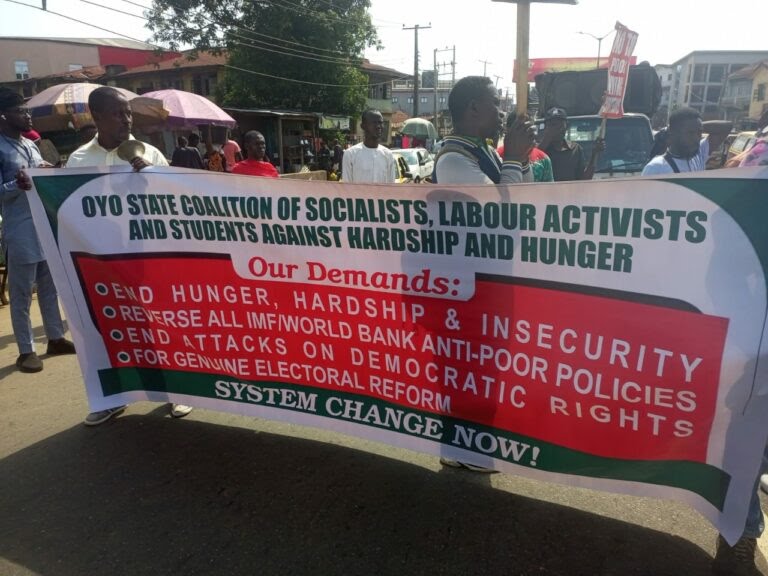Hundreds of protesters took to the streets of Ibadan, the capital of Oyo State, Nigeria, to express their frustration over escalating insecurity, crippling economic hardship and the need for electoral reforms. Organized by the Oyo State Coalition of Civil Socialists, Labour Activists and Students. The demonstrations were peaceful but disrupted traffic along major routes such as Mokola-Adamasingba-Dugbe. The protesters, comprising activists, students and workers, carried placards and chanted slogans calling for immediate government intervention to address hunger, poverty, and widespread insecurity.
The protests highlighted Nigeria’s deepening economic crisis, characterized by a 40% food inflation rate, the highest in nearly three decades, according to data from the National Bureau of Statistics. The removal of fuel subsidies in 2023, coupled with naira devaluation, has driven up the cost of basic goods, leaving millions struggling to afford food and necessities. The World Food Programme reported that 26.5 million Nigerians faced food insecurity in 2024, a figure projected to worsen in 2025 without significant policy changes.
Insecurity was another focal point of the protests, with demonstrators decrying the rampant kidnappings, banditry, and communal violence plaguing Oyo State and Nigeria at large. In Nigeria’s northwest and northeast, armed groups have disrupted farming and trade, exacerbating food shortages and displacing thousands. Protesters specifically called on the federal and Oyo State governments to enhance security measures and address the root causes of these conflicts, which have instilled fear in communities and stifled economic activity.
The coalition also demanded the reversal of what they described as “anti-poor policies” tied to international financial institutions like the International Monetary Fund and World Bank. These policies, including subsidy removals and market-driven reforms, have been criticized for disproportionately affecting low-income Nigerians. The protesters argued that such measures have deepened poverty and unemployment, with youth unemployment rates hovering around 53% in 2024, according to the International Labour Organization.
Electoral reforms were another key demand, with protesters expressing distrust in Nigeria’s electoral system following controversies in the 2023 general elections. They called for transparent and credible electoral processes to ensure fair representation and accountability. The coalition emphasized that without genuine reforms, public faith in governance would continue to erode, fueling further unrest.
This demonstration follows a pattern of protests in Oyo State, reflecting long-standing public discontent. In February 2023, residents protested naira and fuel scarcity, blocking roads like Eleyele/Ologuneru/Eruwa. Similarly, in August 2024, the #EndBadGovernance protests saw thousands in Ibadan demand better governance and economic relief, indicating that the June 2025 protests are part of a broader movement against systemic challenges.
The Oyo State Police Command ensured the protests remained peaceful, deploying officers to maintain order and prevent clashes. The coalition’s spokesperson, Comrade Tunde Afolabi, praised the police for their cooperation but reiterated that the protests would continue until tangible government action was taken. He urged both state and federal authorities to prioritize the welfare of citizens over political interests.
Economic analysts note that Nigeria’s challenges require multifaceted solutions, including targeted subsidies, investment in agriculture, and strengthened security frameworks. The government’s recent efforts, such as the distribution of palliatives in Oyo State, have been criticized as inadequate and poorly implemented. Protesters echoed these sentiments, demanding long-term policies over temporary relief measures.
The protests also drew attention to the broader socio-political climate in Nigeria, where public frustration has been mounting. Social media platforms have amplified these concerns, with hashtags like #OyoProtests and #EndHunger trending in the region.
Historical data underscores the persistence of these issues in Oyo State. In 2021, protests against police brutality under the #EndSARS movement disrupted Ibadan, while economic protests in 2023 and 2024 targeted similar grievances. These recurring demonstrations suggest a deep-seated dissatisfaction with governance and economic management in Nigeria’s third most populous state.
The Oyo State government has yet to issue an official response to the June 11 protests, but Governor Seyi Makinde has previously acknowledged the economic challenges facing residents. In a 2024 address, he promised infrastructure improvements and youth empowerment programs, though critics argue these initiatives have had limited impact. Protesters expressed skepticism about such promises, citing a lack of follow-through on past commitments.




